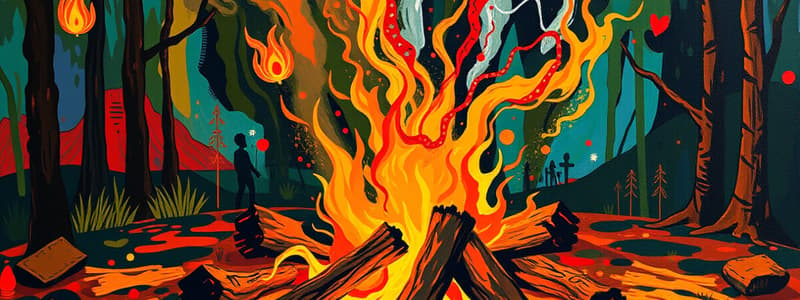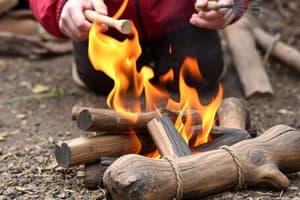Podcast
Questions and Answers
What are some things that Brian tried to light the fire with that did not work?
What are some things that Brian tried to light the fire with that did not work?
Dried grass, twigs, and a bill.
What was the fuel that Brian used that finally caught on fire?
What was the fuel that Brian used that finally caught on fire?
Birch bark.
Why were the sparks 'starved'?
Why were the sparks 'starved'?
They did not have enough oxygen.
Why didn't Brian's shelter get filled with smoke?
Why didn't Brian's shelter get filled with smoke?
What can you infer from the last sentence of the chapter, 'I wonder if she is with him'?
What can you infer from the last sentence of the chapter, 'I wonder if she is with him'?
Why did Brian call the fire his 'guard'?
Why did Brian call the fire his 'guard'?
What kind of animal attacked Brian?
What kind of animal attacked Brian?
What happened to Brian's hatchet when he threw it?
What happened to Brian's hatchet when he threw it?
How many quills were stuck in Brian's calf?
How many quills were stuck in Brian's calf?
How did Brian's sleeping patterns change after being attacked by the animal?
How did Brian's sleeping patterns change after being attacked by the animal?
What was Brian going to do to make fire?
What was Brian going to do to make fire?
Assuming dreams are often based on a person's feelings, what can you infer from Brian's dream?
Assuming dreams are often based on a person's feelings, what can you infer from Brian's dream?
Flashcards
Failed fire starters
Failed fire starters
Dried grass, twigs, and a bill failed to ignite.
Successful fire fuel
Successful fire fuel
Birch bark served as the successful fuel source.
Starved sparks
Starved sparks
The sparks lacked sufficient oxygen to ignite properly.
Smoke-free shelter
Smoke-free shelter
Signup and view all the flashcards
Brian's thoughts
Brian's thoughts
Signup and view all the flashcards
Fire as a 'guard'
Fire as a 'guard'
Signup and view all the flashcards
The attacker
The attacker
Signup and view all the flashcards
Hatchet's Sparks
Hatchet's Sparks
Signup and view all the flashcards
Quills in Brian
Quills in Brian
Signup and view all the flashcards
Changed sleep
Changed sleep
Signup and view all the flashcards
Making sparks
Making sparks
Signup and view all the flashcards
Brian's Dream
Brian's Dream
Signup and view all the flashcards
Study Notes
Fire-Building Challenges
- Brian struggled to ignite a fire with dried grass, twigs, and a bill but faced repeated failures.
- Birch bark proved to be the successful fuel source that eventually caught fire, highlighting its effectiveness in survival situations.
Understanding Spark Formation
- Sparks generated during Brian's fire-making attempts were described as "starved," indicating a lack of sufficient oxygen for combustion.
- Brian's shelter had a design that prevented smoke accumulation due to the rock functioning as a drawing flue, improving air circulation.
Emotional Insights
- The concluding thought, "I wonder if she is with him," reveals Brian's ongoing contemplation about the blonde man, linking his survival experience to personal life difficulties such as divorce.
Security and Comfort
- Brian regarded the fire as his "guard," as it provided a sense of safety against wildlife, insects, and inclement weather, showcasing the psychological aspect of fire in survival.
Animal Encounters
- A porcupine attacked Brian, an encounter that resulted in eight quills becoming embedded in his calf, illustrating the risks he faced in the wilderness.
Impact on Sleep
- Post-attack, Brian's sleep dramatically changed; he transitioned to lighter sleeping patterns, characterized by a more alert resting state rather than deep, restorative sleep.
Hatchet's Utility
- Brian intended to utilize his hatchet to create sparks for fire, emphasizing the importance of tools in survival scenarios.
Dream Analysis
- Dreams reflecting Brian's experiences indicated he was emotionally connected to his father and focused on survival-related cravings like hunger and the need for fire.
Studying That Suits You
Use AI to generate personalized quizzes and flashcards to suit your learning preferences.



